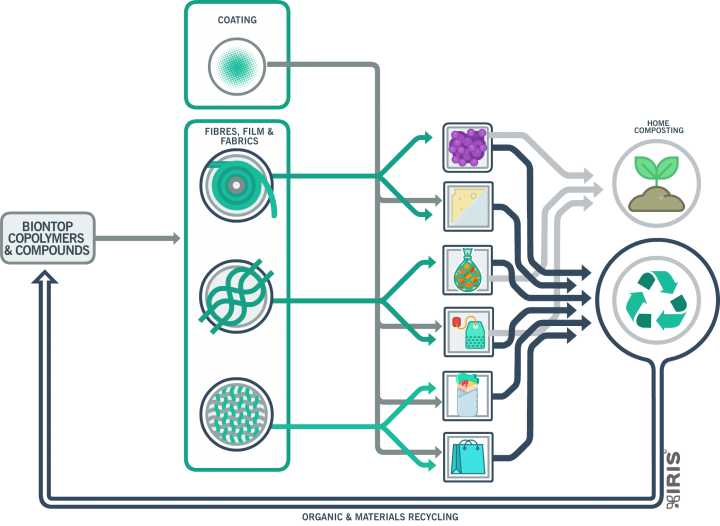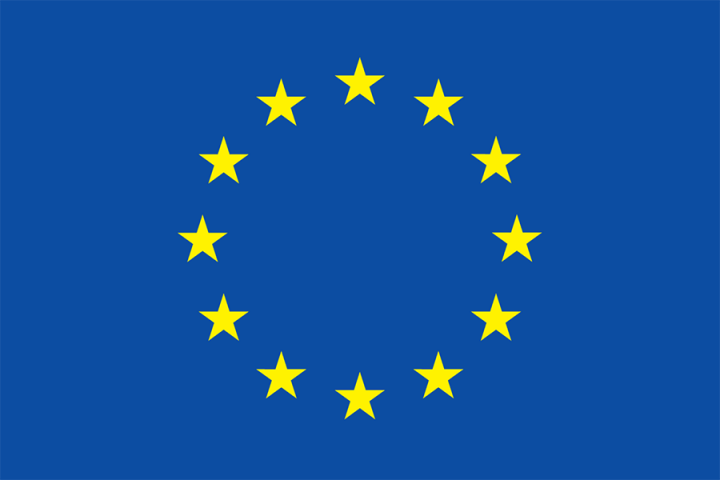Innovatieve verpakkingsfolies en -textiel op basis van biogebaseerde co-polymeren en coatings met een “einde levensduur” op maat
Op dit ogenblik wordt amper 31% van alle kunststoffen gerecycleerd. Vooral het “End-of-Life” van kunststofverpakkingen vertoont nog ernstige tekortkomingen. Daarom is het nodig om kostenefficiënte oplossingen uit te werken om kunststoffen te produceren met een hoog gehalte aan biogebaseerde inhoud en die geschikt zijn voor verpakkingstoepassingen waaraan hoge eisen worden gesteld terwijl ze composteerbaar zijn onder milde omstandigheden.
In dit project worden op basis van co-monomeren, additieven en vulmaterialen van duurzame origine nieuwe PLA co-polymeren en compounds geformuleerd voor de productie van verpakkingen die zijn ontworpen met het oog op mechanische recyclage, die onder industriële/huishoudelijke omstandigheden gecomposteerd kunnen worden en die zelfs geschikt zijn voor anaërobe vergisting. Bovendien worden de barrière-eigenschappen van de bio-verpakkingsschaaltjes, - films en afgeleide verpakkingsproducten verhoogd door de toepassing van coatings op basis van verwijderbare proteïnes en een innovatieve vetzuur enttechnologie, die de permeabiliteit verlaagt zodat deze nieuwe verpakkingsproducten kunnen concurreren met verpakkingen op basis van fossiele grondstoffen.
Op het vlak van textiele verpakkingen zijn de gebruikte coatings niet biogebaseerd en hebben ze een andere oorsprong dan de gecoate vezels, wat de recyclage van het materiaal of organische recyclage zeer complex maakt. Dankzij de ontwikkeling van nieuwe PLA coatings of vetzuur enting kan de herverwerking van deze materialen plaatsvinden zonder verlies van eigenschappen.
De verpakkingen die worden ontwikkeld op basis van >85% hernieuwbare grondstoffen zullen aan een brede waaier vereisten beantwoorden die gesteld worden aan verpakkingen en zullen bovendien verschillende opties bieden aan het einde van de levensloop zoals biodegradeerbaarheid in huishoudelijke composteeromstandigheden en recycleerbaarheid voor secondaire verpakkingstoepassingen.
Based on new circular bioeconomy value chains, BIOnTOP will generate growth for EU bioplastics and end users’ industries in the food and personal care sectors with potential in many fields: BIOnTOP production is estimated to reach close to 9.6 Mton per year by 2030, overall leading to €40 M turnover and 170 new jobs. All in all, reducing the environmental footprint of plastics, our new bio-based packaging will have a significant positive social and environmental impact.
Objectives
The main goal of BIOnTOP is to deliver novel bio-based biodegradable packaging based on versatile copolymers and coatings that optimally preserve the packed products but also our resources (packaging based on significantly >85% renewable resources, partly produced from by-product biomass and recyclable). The different conversion processes as well as post-consumers waste sorting and recycling will be upscaled following advanced industry 4.0 approaches. Based on tailored PLA formulations and removable barrier or monomaterial coatings, BIOnTOP packaging will be compatible with a broad range of packaging applications’ requirements but also multiple EoL options (materials & organic recycling, home & industrial composting and biogas production by AD).

The aim is to develop new bio-copolymers, compounds, biocomposites and coating formulations and process them into:
- Recyclable, home-compostable monomaterial trays & films for fruits and vegetables.
- Recyclable, multilayer trays & films for MAP (modified atmosphere packaging) for e.g. dairy and personal care products.
- Home compostable & organically Recyclable nets for F&V.
- Home compostable & organically recyclable coated textiles e.g. woven fabric tea bags.
- Recyclable, reusable coated woven fabrics e.g. food wraps.
- Recyclable, reusable secondary packaging from SRM (secondary raw materials):
- Extruded blown bags.
- Non-woven bags.
Consortium
- Aimplas - Spain (co-ordinator)
- INSTM - Italy
- Centexbel - Belgium
- Albstadt-sigmaringen university - Germany
- European bioplastics - Germany
- Total Corbion pla bv
- PLANET - Italy
- BioMi - Croatia
- EMSUR - Spain
- CMSA - Spain
- SILON - Czech Republic
- Sioen - Belgium
- WEAREBIO - Estonia
- Entrepinares - Spain
- UBESOL - Spain
- OWS - Belgium
- Romei - Italy
- IRIS - Spain
- ARCHA - Italy
- ENCO - Italy
- MC - Italy
Project related Figures
Budget 5,4M € (BBI-JU contribution 4,2M€)
21 partners (4 RTOs, 9 SMEs, 6 Large, 1 pan EU industry association) and 7 BIC members plus Advisory board
8 countries

Horizon 2020
This project has received funding from the European Union’s Horizon 2020 research and innovation programme under grant agreement No 837761
H2020 – BBI JU
The Bio-Based Industries Joint Undertaking (BBI JU) is a €3.7 billion Public-Private Partnership between the EU and the Bio-based Industries Consortium. Operating under Horizon 2020, this EU body is driven by the Vision and Strategic Innovation and Research Agenda (SIRA) developed by the industry.
A strong European bio-based industrial sector will significantly reduce Europe’s dependency on fossil-based products, help the EU meet climate change targets, and lead to greener and more environmentally friendly growth.
The key is to develop new biorefining technologies to sustainably transform renewable natural resources into bio-based products, materials and fuels. This nascent sector is expected to grow rapidly and create new markets and jobs, and is already attracting substantial investments in the US, China and Brazil. The EU has the industrial, research and renewable resources potential. It is now a matter of deploying it in a sustainable manner to compete in the global bioeconomy race.




